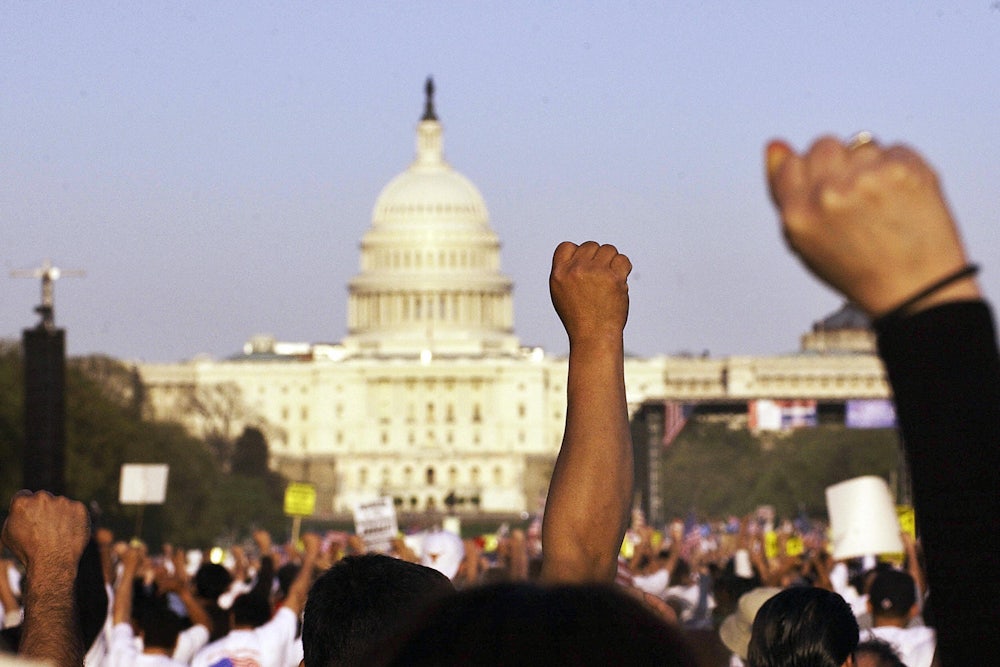President Biden’s closing arguments for the midterms, the first national election since the January 6, 2021, insurrection, were about protecting democracy and freedom. Pundits predicted a wipeout for Democrats, blaming what they saw as excessive attention to threats to democracy.
But a week after polls closed, the results have come into clear focus: Democrats narrowly retained control of the Senate, with the Georgia race to be decided in a runoff December 6, while Republicans won a narrow majority in the House of Representatives. Democrats also saw a net gain of two governorships, with pickups in Arizona, Maryland, and Massachusetts offset by a loss in Nevada. We can now say with confidence that democracy was a big winner of the night.
Still, we are far from being out of the woods on the very real threats to our country’s democracy. As we write this, over 100 lawsuits have already been filed in dozens of states trying to restrict voting access, more than 200 election deniers were elected, state legislatures are poised to further restrict voting, and the Supreme Court will hear a case next month that could transfer control over elections to often partisan state legislatures.
Plenty of talking heads and pundits have sounded the right alarms, but few have offered solutions to blunt the authoritarian threat. Here are six things we can do now to save American democracy.
Our first priority must be
to persuade elected leaders at all levels of government to pass necessary
democracy protections, including urging Congress to pass the Electoral Count Act. There should be no
ambiguity when it comes to certifying the Electoral College.
Second, we need to leverage our sheer numbers and creativity—via a broad-based, multiracial majoritarian movement—to resist. The reality is that most Americans still want to live in a democracy. Let’s work to organize this movement now, and with a sense of urgency. We need to build a pro-democracy coalition that continues to push for structural and institutional reforms, promotes pro-democracy platforms, documents election malfeasance, and checks denialism. Local and community power must be built, cemented, and made resilient to threats against democracy through strategic planning and organized, disciplined action.
We must build alliances between elected officials who believe in the rule of law across parties and levels of government, especially mayors and governors, and urge them to fight to preserve democracy. These elected leaders control large budgets and wield substantial power; they run laboratories of democracy and can use their power to protect the rights of all citizens.
Third, Congress must regulate social media platforms to curb their continued assault on democracy, truth, and public safety. If Congress won’t act, we need executive orders, antitrust lawsuits, and more consumer pressure to force some measure of corporate responsibility on those companies.
A tsunami of disinformation corrodes our daily lives and our democratic institutions. Social media platforms, seeking ever greater profitability, benefit from amplifying disinformation and hate. Recently, more than 60 public interest groups warned tech executives that platforms are still failing to take down false information and threats of violence, as well as continuing to support the spread of election denialism. And new research has found that women of color running for office are four times more likely to be targeted online with violent abuse than white male candidates, and twice as likely to be targeted with disinformation.
As with traditional town squares, the digital equivalent also can and must be regulated to protect people and the public discourse. We can protect free speech and protect our democracy at the same time with thoughtful, carefully crafted regulation. While there is bipartisan support for holding Big Tech accountable, the Biden administration and we as consumers must drive that progress.
Fourth, we must hold the media accountable whenever they revert to promulgating false equivalencies. Conflating Stacey Abrams’s caveated concession in 2018 with former President Trump’s “Big Lie” and “Stop the Steal” movement, as well as his incitement of a violent attack on the Capitol, is disconcerting and wrong. Lending credence to this framework does not serve the public and discredits the media—all while getting swamped by Fox News and the right-wing media ecosystem. The mainstream media should be clear and direct with citizens about what’s happening, sound the alarm, and not normalize the current state of affairs.
Fifth, political and electoral reforms are central to restoring trust in democratic institutions; we must fix the parts of our government and election systems that are undemocratic. These reforms include ranked-choice voting, ending gerrymandering, and protecting everyone’s right to vote. We must also retire the antiquated Electoral College, reform a runaway judiciary that has breached the boundaries of its purview, and work to make Congress more representative.
Losers of the popular vote should not be “elected” to office, and the lifetime appointments of federal judges should end. The size of the House of Representatives ought to be expanded to better represent voters, and California’s 40 million residents should have more representation in the Senate than Wyoming’s 600,000. Research has shown that even under autocratic regimes, democratic reforms still matter and can lead to greater democracy over time. Our country—the cradle of democracy—deserves a representative governance worthy of its people.
Finally, never forget that resistance—sustained organizing and protest—works. Between 2016 and 2020, organizers stopped countless repressive policies and built support for restoring sanity. Now we need to draw on our country’s long history of successful protest to protect human rights and defeat efforts to restrict abortion, voting rights, and civil and human rights.
There is a time limit on how long any government can stay in power without the consent of the governed. For representatives who fail to uphold election integrity, democratic principles, and basic human rights, let’s work to shorten that time.










